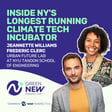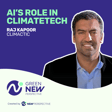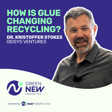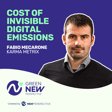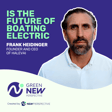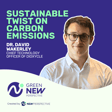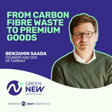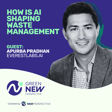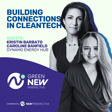
Decarbonizing Heavy-Duty Engines: Podcast With ClearFlame
How can we address the carbon emissions from diesel engines, which are deeply integrated into global economies but also present significant environmental challenges?
While electric vehicles are often highlighted as the solution, ClearFlame presents an immediate and innovative alternative that drives us toward a cleaner future—without the need to wait for EV infrastructure to catch up.
In this discussion, BJ Johnson, co-founder and CEO of ClearFlame Engine Technologies, shares how his company is offering a practical solution by decarbonizing traditional diesel engines. We’ll explore the story behind ClearFlame, understand their technology, and discuss its implications for the future of clean energy.
📚 Follow ClearFlame:
━━━━━━━━━━━━━━
- Website: https://clearflame.com/
- LinkedIn: https://www.linkedin.com/company/clearflameeng/
👉 Interview with BJ Johnson: https://www.npws.net/podcast/decarbonizing-engines
🎧 Subscribe to our podcast:
━━━━━━━━━━━━━
- Spotify: https://bit.ly/3PSWIyI
- Apple Podcasts: https://bit.ly/3RvlHte
- Youtube: https://bit.ly/3RDzkXg
- Deezer: https://bit.ly/3PvQaof
- Amazon Music: https://bit.ly/3PQlijS
- Zencastr: https://bit.ly/48xt75s
💬 Follow GNP podcast on social media:
━━━━━━━━━━━━━
- Instagram: https://www.instagram.com/greennewperspective/
- LinkedIn: https://www.linkedin.com/company/new-perspective-marketing/
- Facebook: https://www.facebook.com/greennewperspective
- TikTok: https://www.tiktok.com/@greennewperspective
🌍 Cleantech podcast created by New Perspective Marketing
━━━━━━━━━━━━━━━━━━━━━━━━━━━
This podcast is proudly sponsored by New Perspective Marketing, a dynamic growth marketing agency in Boston, MA, celebrating 20 years in business. We help sustainably focused B2B organizations grow their brands and scale up revenue. If you or your organization is looking to grow, visit https://www.npws.com for more info.
💚 GNP Team:
━━━━━━
- Host & Co-Producer: Dunja Jovanovic
- Executive Producer: Marko Bodiroza
- Creator: Nathan Harris
- Video Editor & Content: Marija Davidoski
#Sustainability #CleantechPodcast #CleantechMarketing

